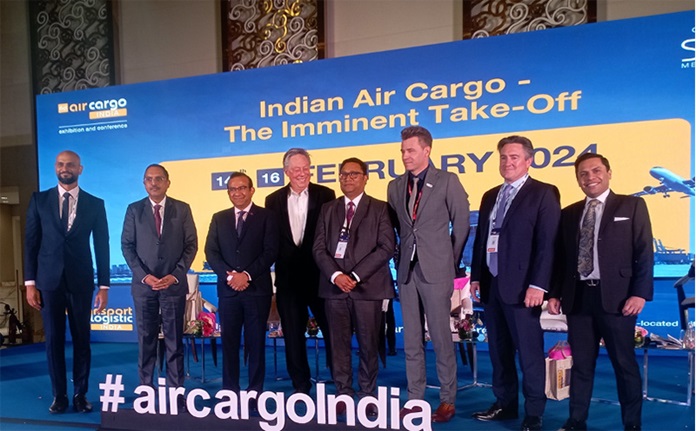India has set an ambitious target of reaching 10m tons of air cargo handled per year by 2030, attendees at the Air Cargo India 2024.
“This is India’s time for growth,” said Sanjiv Edward, chief executive – cargo and logistics at the GMR Group which operates Delhi, Hyderabad, and Manohar (Goa) airports and is developing two others. “Maybe 10m is less ambitious, maybe 12m is the right number,” Edward said.
India already moves 3.5m tons of air cargo but strong fundamentals suggest 10m is doable, said Ramesh Mamidala, head of cargo for Air India, but will require some effort on the sector’s part. “Everybody has to scale up their capabilities to ensure the country achieves that number… we are excited,” he said.
One reason for this optimism is the level of growth already being recorded from India’s tier-one cities; Mumbai, Delhi, Kolkata, Chennai, Hyderabad, Bangalore, and Ahmedabad.
Tier two and three cities are also growing rapidly – India has 97 tier two cities which tend to be densely populated with decent infrastructure and development. Tier three cities are less densely populated.
“It will happen in tier three as well,” Mamidala said, adding growth would be led by Air India starting international operations from these smaller cities.
Part of this positivity around the target is down to the ongoing boom in e-commerce.
“Maybe 30% should easily come from the domestic volumes. We see e-commerce growing significantly across the country,” Mamidala said. Cross-border e-commerce will also contribute to meeting the 10m tons target.
Currently, e-commerce exports have a value of “only some $450m” to quote Mamidala but could be worth so much more provided some changes are made. “We believe with policy support the number is expected to become anywhere from $2-3bn,” Mamidala said.
One was improved customs processes to enable a more efficient flow of goods and the other was improved collaboration across the air cargo supply chain.
Industry Lookout
To help improve the situation, India’s air cargo industry has been busy lobbying the government, which tends to be pro-business and development. Recent successes for the industry include airport privatization, new builds, and a decision to allow flights from anywhere in the world to go to any airport in India.
Previously international flights were limited to only six airports. However, this decision has been criticized by some in the industry as it could result in increased competition for Indian airlines.
“Please protect your Indian carriers and not open up the skies of India,” warned Sanjeev Gadhia, founder and chief executive of Africa-based Astral Aviation in another session of the conference.
Government policies have helped the country to boost manufacturing as companies like Apple, Foxconn, HP, and Samsung utilize its young and often highly educated workforce to produce volumes of high-tech products, which are particularly suited to air cargo.
Yashpal Sharma, managing director of Skyways Group reported 16% growth in electronics and 51% growth in smartphone exports from the country.
Manoj Singh, chief cargo officer for Adani Airport Holdings, suggested that by 2030 exports could be worth 2trn dollars of which manufacturing might be $1trn. On top of this, pharmaceuticals, especially out of Hyderabad and Bangalore, are growing rapidly. However, pharma transport operations could present a big test for the air cargo sector in India.
The pharma industry is currently valued at $1.5trn globally but the American market alone is expected to be worth $1trn by 2040 as its population ages.
Already there are some small concerns over the quality of Indian exports because of a strained supply chain, which could worsen and be challenged by more advanced treatments, such as nuclear medicine for cancer.
These sensitive treatments can have a lifespan of less than a day and will require a new approach to logistics, said Frank Van Gelder, secretary general of industry trade body Pharma.Aero.
“You can’t make it with standard services… no one is ready,” he told another session. “We need to work closely together.”
Another challenge for India’s air cargo sector is transshipment, which is in its infancy in the country. Mumbai, Bangalore, and especially Delhi are being tipped as hubs, with Delhi already being dubbed ‘the Mother hub’.
Air India’s Mamidala said transshipment volumes could reach 2m tons per year but there was acknowledgement throughout the conference that it would require significant regulatory reform. “We are working with the regulator to simplify the process,” said GMR’s Edward.
Two areas were identified for improving transshipment efficiency: security and customs processes.
The consensus was that customs must become more efficient so that Indian airlines and airports can compete with major hubs outside the country, according to one attendee. It is a sign of India’s ambition that it wants to bracket itself with airports such as Dubai and Singapore.
Another big concern is the fragmented use of digital technologies.
“We do bits and pieces in lots of places,” said Ashok Rajan, senior vice president, and global head of cargo and logistics solutions, at IBS Software at a session of the conference. “There is a need for us to buy into a single vision,” he added.







